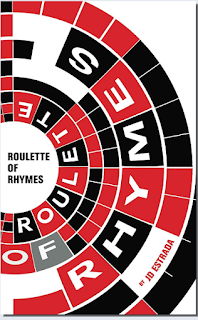Roulette of Rhymes by JD Estrada review
A gambling theme permeates many of the poems in JD Estrada’s Roulette of Rhymes. Card games, the eponymous roulette, and fortune-readings of various kinds feature. There’s a beautiful description of soy sauce being read beneath sushi; other pieces employ card and dice metaphors to describe life. But there’s a diversity to the poems too which suggests that, as Forrest Gump says, you never know what you’re gonna get.
I was first introduced to JD Estrada by his fellow poet and author Katya Mills. From a subjective perspective, their poetry can be, very occasionally, stylistically similar. Personally, all credit where it’s due, I feel that where I may have lauded Katya for creativity, I might have found fault in JD’s work. Why is that?
I started into his novel Only Human. I have been reading it for probably two years on-and-off. It has a Gilliamesque lunacy to it, and some wonderfully creative universe building in a very promising series that explores the human condition via the prism of vampire companions, angels and dragons, among other creatures, through the eyes of a jaundiced newspaper reporter who no longer has any interest in the news.
Each time I returned to it over the last couple of years, I had either forgotten what I’d read the last time, or I had glossed over too many elements to a point where I need to revisit. It’s not the only thing I’ve been unable to read lately, and I need to work on returning to that ability, if I ever had it to begin with.
In this collection, Estrada shows great lyrical skill. I don’t know if some of his poems are songs (and he’s a talented musician too). If not, they should be. The Beatles have been criticised for poor writing in their lyrics. But look at the likes of Eleanor Rigby, or their quirkier later stuff. Much of JD’s poetry is on a par, and much of his other work here – as standalone literary endeavour – is probably superior.
There’s also logic to Estrada’s work that is easier to attack than the likes of Katya above, perhaps. I’ve told Katya that her work is almost like Outsider Art, but she knows what she’s talking about. The logic of JD’s work might be more similar to mine, if I could suggest that. And perhaps that’s why I have been quite dismissive.
When it comes to exploring villainy, Estrada appears to twirl the moustache, and chew the scenery. It’s not that he doesn’t have a dark side. He’s more than capable of capturing the essence of evil at certain points in Only Human, say. (There’s Snakes on a Ship in that novel that proves that!)
But occasional silly wickedness aside, he clearly wears his heart on his sleeve, and the honesty of most of the poems I’ve read is apparent. There are a brace or more of pieces that adeptly capture the frenetic nature of urban life.
Two poems on sleep, A prayer for the sleepless and Sleep, are very different – the first with a lullaby-like quality, the latter far more erotic. This nursery-rhyme style again is something that I’d have criticised. But that’s what it’s meant to be, and the fault is perhaps mine in misreading. JD could probably present the literary equivalent of a Cubist painting to me and say “What do you think?” before he showed me his Turner-like seascapes that would impress me more. The same could be said of these two poems.
The Modernist mundanity of The Madness of Jonathan J. George – involving a kind of imaginative stock-taking at start of day, and a breakfast – is reinforced through the use of Tolkien vocabulary in the second piece of this longform series at the collection’s end. Walter Mitty meets Prufrock at the outset, but as the poems progress, a fantastical odyssey is undertaken as we chart the hero’s descent into madness, involving mountaineering, the meeting of godlike figures, and a reconciliation invoked by strength of will over the trauma of life. It’s a powerful work, perhaps somewhat autobiographical, and perhaps, partly, a beautifully didactic call to Estrada’s fellow artists to strip themselves to their essences and to write from the heart.




Hmmm would I get something here? I mean will I be able to get some strategies here even though I am playing online egames?
ReplyDeleteIt might spark some ideas, sure! But it is a fine poetry book at its heart by a great writer with the focus on literature.
Delete